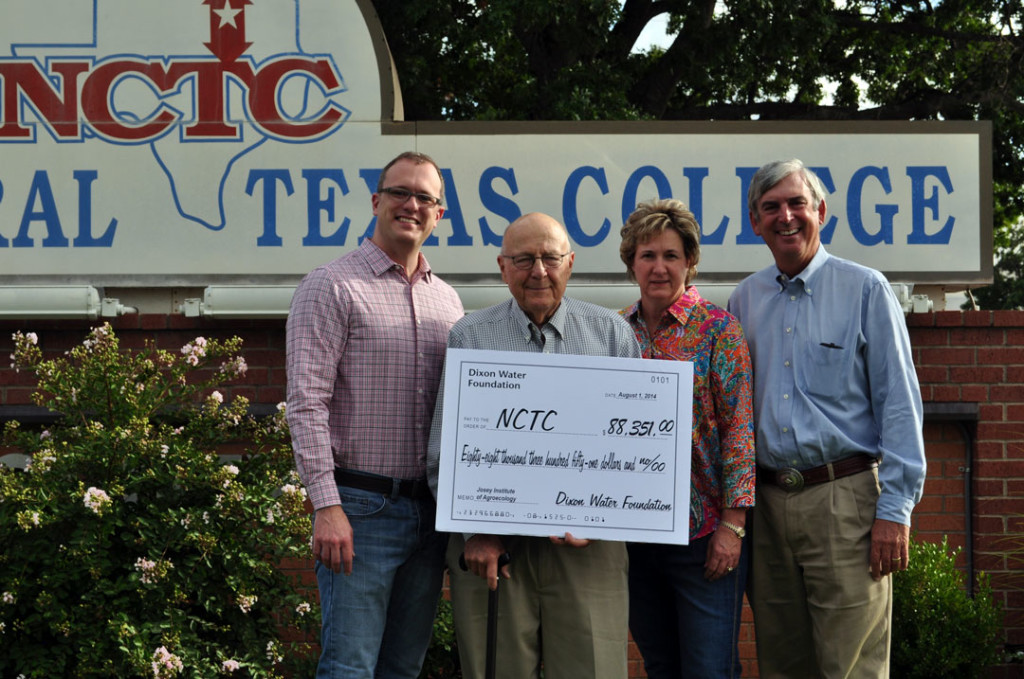Last fall, a new initiative was announced that focuses on watershed enhancement with landowner participation. Dixon Water Foundation and the Horizon Foundation help in supporting this initiative which is coordinated by the Borderlands Research Institute at Sul Ross State University with Conservation Delivery provided by the Rio Grande Joint Venture. For more info, please visit the link below to be taken to the press release about the initiative.
PRESS RELEASES
Dixon Water Foundation Selects Casey Wade as New President and CEO
Decatur, Texas (March 10, 2023) – Dixon Water Foundation, a Texas-based non-profit organization that promotes healthy watersheds through good land management, is announcing the selection of Casey Wade as new President and CEO. Wade has been with the Foundation for 12 years, first serving as West Texas ranch manager before being promoted to Vice President of Ranching Operations. Wade was selected by the Foundation’s Board in early February 2023. Wade will immediately begin to succeed out-going President and CEO Robert Potts who is retiring March 16, 2023 while still serving as Chairman of the Board for the Foundation. Potts has served as President and CEO since 2007.
“I am pleased that the board chose Casey Wade, our current VP for Ranching Operations, to be my successor,” states Potts. “He is an excellent choice and will lead the Foundation to the next level of effectiveness.”
Wade’s selection as President and CEO follows years of commitment to the management of the Foundation’s ranches, communication of the Foundation’s mission and guiding principles, and role as a valuable advocate of regenerative agriculture and watershed health.
“I’m really honored to have been chosen by the Board of Directors to serve as the new President and CEO of Dixon Water Foundation. Robert has done an amazing job of establishing the Foundation as a leader in watershed and ecological health. I’m looking forward to continuing to work with Robert as he serves as Chairman of the Board.” states Wade. “Looking ahead, I see so many great opportunities for the Dixon Water Foundation. We have an amazing staff, really talented people, who are very knowledgeable and care deeply about our mission. It’s such a pleasure to get to work with them and be part of guiding the Foundation into the future.”
Wade is a husband and a father of three young sons. He has a love of the land and has enjoyed caring for wildlife and livestock for many years. He is a graduate of Hardin Simmons University and has spent most of his career managing hunting and wildlife operations as well as livestock ranches.
After a two year stay in Kenya, Africa, Casey was introduced to holistic land management while working with a wildlife management consulting firm. He was drawn to the idea of using livestock to improve degraded landscapes. At that point Casey began searching out further education and eventually a career in regenerative land management through ranching. Dixon Water Foundation strives to achieve its mission through its research and demonstration ranches in Presidio County, near Marfa, Texas, and Cooke and Wise Counties, near Decatur, Texas. The Foundation hosts education events, supports research, awards grants and partners with organizations in line with their mission.
BCarbon Begins Joint Research Project on Soil Carbon Sequestration with ExxonMobil Research and Engineering Company
Project involves 20,000 acres of public and private grasslands.
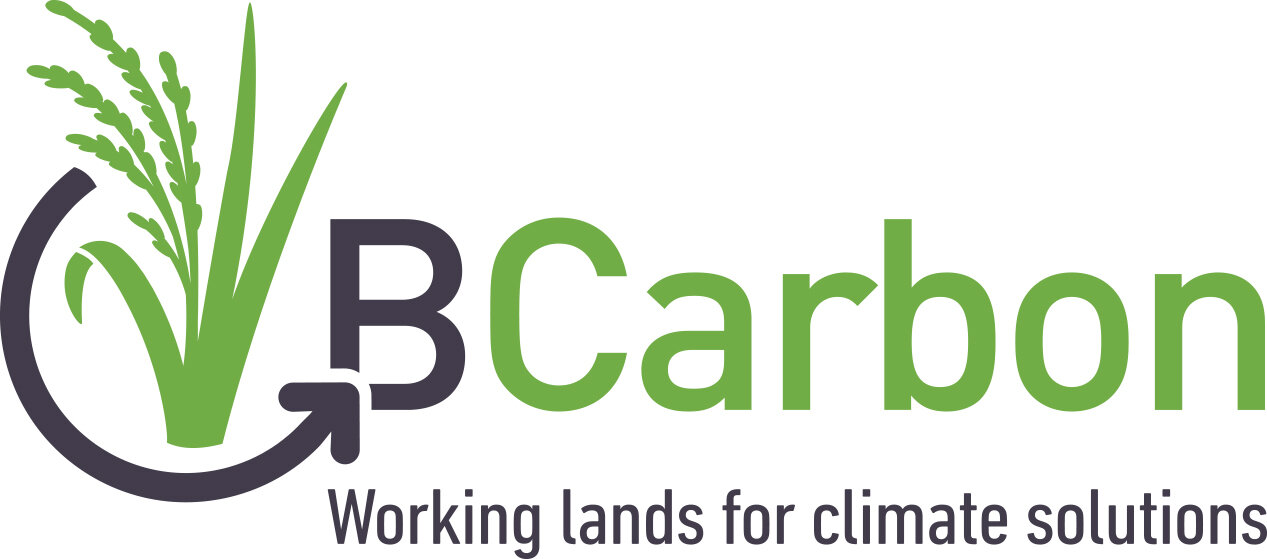
BCarbon and ExxonMobil Research and Engineering Company (EMRE) will begin a three-year study of nature-based carbon sequestration potential in association with the King Ranch, the EXELL Cattle Company, the Clark Farm, the Dixon Water Foundation, the North Dakota Department of Trust Lands, the New Mexico Department of Agriculture, and the New Mexico State Land Office.
The research will measure variation in carbon sequestration rates between tallgrass, shortgrass, and Texas coastal prairie ecosystems across a variety of climate and soil conditions as well as quantify range management impacts on water and biodiversity. Other key capacity and cost issues will be studied, including new measurement technologies and regional soil carbon analysis infrastructure including data analytics, laboratories, education, and training.
BCarbon is a non-profit carbon credit certification organization based in Houston, Texas that was created in 2020 by a diverse stakeholder group sponsored by the Center for Energy Studies at Rice University’s Baker Institute for Public Policy.
Jim Blackburn, CEO of BCarbon said, “Nature-based systems have the potential to significantly reduce our carbon footprint as well as provide far greater resilience for floods and droughts. This is the kind of real-world collaboration we believe will produce lasting results. And make no mistake about it – we are looking to create lasting results on climate, ecology and economics.”
Robert Hodgen, President and CEO of King Ranch, Inc. stated, “This project aligns with several of our core values including innovation, sustainability and support of rural communities. Our team is excited to collaborate with BCarbon and EMRE in this important project to define the natural carbon sequestration capacity of ranchlands across the country.”
Land Commissioner Jodi Smith with the North Dakota Department of Trust Lands added, “The Department manages over 700,000 surface acres of trust lands to provide funds for public schools and other public institutions. Managing these lands to naturally store more carbon could be important for the future funding of public education in North Dakota, and for meeting the state’s goal of carbon neutrality by 2030; however, we need the research to help us plan more effectively.”
Julie Maitland, Division Director for Agricultural Programs and Resources at the New Mexico Department of Agriculture said, “New Mexico is leading important efforts in climate change. Understanding how soil carbon might offer both climate solutions and important new economic revenue streams to our rural areas is critical to our long-term strategy.”
Will Barnes, Deputy Director of the Surface Resources Division of the New Mexico State Land Office added that, “working with state land agricultural lessees to conduct this kind of world class scientific research is vitally important to the protection of resilient rangelands and rural economies in New Mexico and helps the Commissioner’s efforts to create new diverse revenue streams on behalf of New Mexico public schools, universities and hospitals.”
Robert Potts, President of the Dixon Water Foundation offered, “We have supported our own research into soil carbon in the past. We know it occurs. We are very pleased to have a chance to extend our knowledge to areas like our Marfa, Texas ranching operations in drier climates where soil carbon accumulation will be more challenging.”
Dr. H.C. Clark, Owner of the Clark Farm in Texas, appreciates being part of this research project stating, “I’ve been reading about this potential soil carbon market for several years and am excited to be a part of the development of science-based research to help make better-informed decisions.”
“ExxonMobil’s continued investment in R&D plays an important role in developing breakthrough solutions aimed at reducing greenhouse gas emissions intensity across our businesses,” said Vijay Swarup, Vice President of Research and Development at ExxonMobil. “This collaboration with BCarbon is designed to study the nature-based carbon sequestration potential in grasslands in multiple states, with the potential to be deployed on and around ExxonMobil operations.”
The project will be underway as of January 15th , 2022, and research updates will be posted here regularly. For further information, contact Jim Blackburn, CEO and Chairman of the Board for BCarbon, at blackbur@rice.edu.
View full press release here.
Borderlands Birding Bonanza events scheduled Nov. 14 & Nov. 15 in West Texas

Originally posted by Borderland Research Institute here.
ALPINE TX – Birding enthusiasts of all skill levels are invited to attend Borderlands Birding Bonanza events in West Texas on Nov. 14 and Nov. 15. The birding field trips will take place at the Dixon Water Foundation’s Mimms Ranch near Marfa. Registration is required and participants can sign up at https://bri.sulross.edu/events/.
The Borderlands Research Institute (BRI) at Sul Ross State University launched the new series of outreach activities in October to connect people with birds through its Bird Conservation Program. The first event, held Oct. 24-25 at Alamito Creek Preserve in Presidio County, attracted 40 birders from El Paso to East Texas.
“A good time was had by all and it was great to see people connecting with birds and nature,” said Dr. Louis Harveson, who is the Dan Allen Hughes, Jr., BRI Endowed Director and Regents’ Professor of Wildlife Management at Sul Ross State University. “We are excited about these new outreach opportunities, and we are extremely grateful to the Dixon Water Foundation and the Shield-Ayres Foundation for making these events possible.”
The October events were led by knowledgeable birders, including BRI graduate students Alex Chavez and Emily Card, local birding experts, and staff of the Dixon Water Foundation.
“We saw a lot of cool birds, including an American kestrel, western bluebirds and Lincoln’s sparrows,” said BRI graduate student Emily Card. “We all got very excited when we spotted an eastern sub-species of the northern flicker, because that’s a rare sighting around here.”
The goal of BRI’s Bird Conservation Program is to advance the awareness, appreciation, and conservation of birds in West Texas. With over 500 bird species in the region, it is no wonder that West Texas is a favorite destination among birders. Birding is also one of the main outdoor recreational activities from which landowners can derive substantial income, and BRI is working with private landowners to learn more about the bird species in West Texas.
Besides the field trips associated with the Borderlands Birding Bonanza, BRI’s Bird Conservation Program will be implementing a number of new initiatives to engage citizens in bird conservation. Upcoming activities will include bird photography workshops and educational seminars. In addition, a citizen science project will be developed that will document bird populations on private ranches through long-term monitoring efforts.
Register for the Nov. 14 and Nov. 15 birding field trips at https://bri.sulross.edu/events/
For more than a decade, the Borderlands Research Institute has encouraged effective land stewardship of the Chihuahuan Desert. Housed at Sul Ross State University, the Borderlands Research Institute builds on a long-lasting partnership with private landowners, the university’s Range and Wildlife Program, and cooperating state, federal, and non-governmental organizations. Through research, education, and outreach, the Borderlands Research Institute is helping to conserve the last frontier of Texas and the Southwest.
Members of the scientific community respond to dismissal of reduced emission benefits of regenerative agriculture
A recent blog post by the World Resources Institute (linked here) called into question the ability of regenerative agricultural practices to help mitigate emissions that contribute to climate change. In response, several members of the environmental and agricultural science community composed a rebuttal article which is linked here.
Our Foundation’s goal is to conserve water resources and sequester carbon through good land management. Our stewardship and research efforts constantly strive towards understanding the ways that our management intersects with these goals.
Baker Institute-led group to develop nationwide protocol for storing carbon
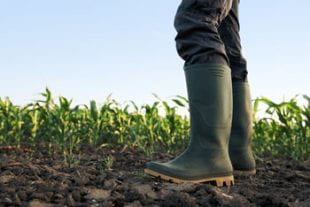
HOUSTON — (Dec. 3, 2019) – Rice University’s Baker Institute for Public Policy has initiated a working group to develop a United States protocol for paying ranchers and farmers to store carbon in their soil. The current system for voluntary carbon transactions is broken and needs to be fixed, group founders said.
The group is co-led by attorney Jim Blackburn, a professor in the practice of environmental law at Rice, Baker Institute Rice Faculty Scholar and co-director of the university’s Severe Storm Prediction, Education and Evacuation from Disasters Center (SSPEED), and Kenneth Medlock, the James A. Baker III and Susan G. Baker Fellow in Energy and Resource Economics and senior director of the Center for Energy Studies at the Baker Institute. Robin Rather, CEO of Austin-based Collective Strength, is the group’s facilitator.
Most accepted carbon transactions in the world today occur based on standards that originated from the Clean Development Mechanism of the Kyoto Protocol to the United Nations Framework Convention on Climate Change. These standards impose significant and unnecessary impediments to U.S. landowners, so few or no transactions actually happen, Blackburn said.
“We formed this group out of necessity,” Blackburn said. “While there are specifics of the existing standards that are useful, an overall new approach is needed, and the Baker Institute was willing to act as our host in convening this working group. We have assembled a diverse group that I feel sure will develop an excellent, defensible concept.”
There are many ranchers and farmers in the southwestern and central U.S. whose land has substantial potential to remove carbon dioxide from the atmosphere, according to the working group. However, they are being kept from participating by the current standards for voluntary carbon trading — standards that were not developed to optimize carbon storage in the soil, the group said. The need for a defensible new standard has led to the formation of the group, Blackburn said.
“This protocol is intended to enable a market system for the voluntary trading of carbon removal and storage in the soil,” Medlock said. “This is an exciting idea that has the potential to add a scalable alternative into the portfolio of companies looking to reduce their carbon footprint.”
Natural photosynthesis removes carbon dioxide from the atmosphere and stores it in the wood of trees and the soil of the country’s prairies and coastal marshes and soils of agricultural lands. “In the United States, the potential exists for the removal of 1 to 2 billion tons of carbon dioxide or more by these natural systems, yet to our knowledge, only one grassland project has been approved in the U.S. for carbon sales,” Blackburn said. “As we move toward attempting to avoid, minimize and remove the U.S.’s 7-billion-ton carbon dioxide footprint from the atmosphere, we are going to need a range of alternatives that remove and store carbon.”
Through carbon farming, farmers and ranchers could reap an additional source of cash flow, one that also would help restore native ecological systems that would generate fish and wildlife benefits, according to the working group. Additionally, industries and businesses that emit carbon dioxide will be provided with a scalable and affordable carbon dioxide removal process. “If enabled, this system will be a win-win on many levels,” Blackburn said.
Over the next several months, the working group will convene to discuss topics such as general principles of eligibility, measurement protocols and buyer needs. The goal is to develop a set of principles for these transactions that will be endorsed by the diverse group of 45 stakeholders from nongovernmental organizations, governmental entities, Native American nations, corporations, universities and consulting firms.
The 45 stakeholders include but are not limited to experts from Gensler Inc., King Ranch Inc., the Nature Conservancy, Audubon Texas, Applied Ecological Services Inc., Texas Parks and Wildlife, the Texas Coastal Exchange, the New Mexico Department of Agriculture, GSI Environmental Inc., Texan By Nature, the USDA Natural Resources Conservation Service, the Lone Star Coastal Alliance, the Quivira Coalition, Sprint Waste Services, the Dixon Water Foundation, Climate Action Texas, the Cynthia and George Mitchell Foundation, Valero Energy Corp., the U.S. Business Council for Sustainable Development, the U.S. Environmental Protection Agency, America’s Wetland Foundation, the Soil Value Exchange, the Western Landowners Alliance, Batker Consulting, the Meadows Foundation and the Savory Institute, as well as the Baker Institute, the SSPEED Center, Rice’s Energy and Environment Initiative and Earth sciences department, and several subject matter experts.
When completed, the working group’s concept will be available and open to anyone who wants to buy or sell carbon.
Jeff Falk
713-348-6775
jfalk@rice.edu
Grantee examines soil microbes
ABILENE—Under every farm and ranch around Abilene, a universe of microorganisms is toiling in the soil. Hardin-Simmons University researchers recently received a Dixon Water Foundation grant to explore how land management affects this subterranean world on a Runnels County ranch.
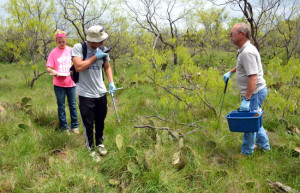
Hardin-Simmons University students Karissa Olson, Isaiah Longoria, and Michael Flud collecting soil samples from the wildlife pasture at Newman Ranch. Photo by Marla Potess
“Our food, our water resources, and many other ecosystem services start with soil,” said Marla Potess, an HSU environmental science professor leading the research. “Over the last 100 years, we’ve been really hard on our soils. Even with good, scientifically based management, soils are degrading, and many ecosystems are moving from highly productive to less productive. So I’m very interested in managing soils to improve microbial biodiversity, which may impact water retention and plant biodiversity and productivity.”
In what they hope will become a long-term study, Potess and HSU biology professor Jennifer Hennigan are examining soil microorganisms on the Newman Ranch in Runnels County, about 40 miles south of Abilene. HSU professor emeritus and trustee George Newman invited the university to use his ranches as outdoor laboratories and created an endowment to fund research on his family property.
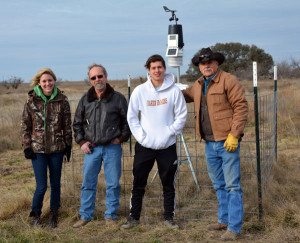
HSU environmental science students with professor emeritus Dr. George Newman by the weather station at Newman Ranch. Photo by Marla Potess
“For the past 40 years, as time and finances have allowed, I have been converting my cropland back into native grassland,” Newman said. “I feel that my philosophy of land stewardship closely mirrors that of the Dixon Water Foundation and I am very appreciative of their support for this program.”
The Newman Ranch study sites have the same soil type but have been managed very differently, Potess explained. For example, one site is a cultivated hay grazer field, while another is being restored to native prairie grasses. Potess and Hennigan are looking for differences in the soil microbial communities at each site, which they eventually hope to correlate with different management techniques used in each pasture.
HSU students have been actively involved in the research, collecting and analyzing soil samples and drafting research proposals related to the project. The Dixon Water Foundation grant will fund DNA sequencing that will provide a snapshot of the microbial diversity at each study site.
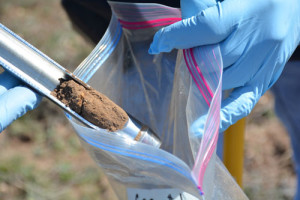
The Dixon Water Foundation grant will be used to analyze DNA from soil core samples collected earlier this year. Photo by Marla Potess
“It’s exciting for students to participate in a project that’s asking really important questions and filling in real information gaps,” says Potess. “The preliminary data this spring indicates we’re on the right track, so we’re really excited to see what we find this summer when the DNA is extracted and processed.”
Ultimately this research could help farmers and ranchers better understand how their actions aboveground affect the microscopic world underground.
“The hypothesis is if soils have diverse, healthy microorganisms, they can hold more water,” Potess said. “And that has important implications for drought resistance for crops and restoring grasslands.”
Those implications helped attract support from the Dixon Water Foundation, which promotes healthy watersheds through sustainable land management. The foundation funds research and education projects tied to this mission and demonstrates sustainable grazing management on its four ranches in North and West Texas.
“We hope this research will help farmers and ranchers improve the economic productivity of their land by building healthier soils and healthier watersheds,” said Robert Potts, the foundation’s president and CEO.
Talking Dirty: soil health workshop Mar. 20-21
If you consider yourself a gardener, farmer, rancher or landscape architect, think again.
“Instead, you are a soil manager,” says Dr. Elaine Ingham, who will be giving a workshop and free lecture on soil health March 20-21 at Cedar Valley College in Lancaster.
Ingham is a leading soil microbiologist, composting guru, and former chief scientist of the organic-farming icon, The Rodale Institute. Whether your soil is growing tomatoes in an urban backyard or cattle forage in a pasture, Ingham offers practical knowledge about how to make soils and plants flourish without synthetic chemicals.
The free lecture on Friday, “Talking Dirty Soil Solutions,” provides an introduction to the soil food web—the complex system of microorganisms that create and sustain healthy, fertile soil. The lecture will be held in the Cedar Valley College gym from 9am to 10am.
A full-day workshop on Saturday delves deeper into the soil food web, compost, and compost tea technology. Ingham will explain the elements of a thriving soil food web, teach participants how to analyze and improve soil, and demonstrate how to make composts and organic extracts to strengthen the soil food web. This workshop costs $99 and will be held from 9am to 5pm in Cedar Valley College rooms M121-M122.
Ingham will share more of her wisdom during a benefit dinner on Thursday, March 19, at the Farm Girls’ Waxahachie classroom. Live music by Justin Smith and a farm-to-table banquet prepared by Chef Amy, co-owner of Field to Meal, will raise funds to provide free workshop passes for agricultural producers. The festivities start at 7pm and the requested donation is $65 to $150. To reserve a spot at the banquet, visit https://www.eventbrite.com/e/farm-to-fork-dinner-benefitting-farmers-tickets-15826384141
For more information, to register, or to nominate a producer for a free workshop pass, visit carboneconomyseries.com or call (469) 554-9202. The lecture and workshop are presented by the Carbon Economy Series, in partnership with the Dixon Water Foundation.

Dixon funds agroecology institute at NCTC
GAINESVILLE―A new institute at North Central Texas College will promote sustainable agriculture and healthy food production.
The Josey Institute for Agroecology will conduct research and offer educational programs on sustainable ranching and farming for NCTC students, as well as land owners and the general public. The institute’s creation was funded through an $88,000 grant from the Dixon Water Foundation, which promotes healthy watersheds through sustainable land management and has two ranches in Cooke County.
“This institute will help train a new generation of land stewards to manage economically and ecologically sustainable ranches, which are so important to our state’s future,” said Robert J. Potts, president and CEO of the Dixon Water Foundation.
Receiving the foundation’s check on his first day as NCTC president, Dr. Brent Wallace said, “Service to the community is a vital part of our mission. The establishment of the Josey Institute at NCTC is going to allow us to explore some innovative approaches in serving our students, as well as the entire community, by including programs for planetary sustainability. We are extremely grateful for the monetary contribution, but even more honored to have the opportunity to work in partnership with the people at Dixon Water Foundation.”
Science professor Lisa Bellows will direct the institute. “This will be an exploratory year for the Josey Institute, so that we can define the needs of our community, organize our approach, and target the position of NCTC as a leader in agricultural ecology,” Bellows said.
The institute will serve as the new home of the Promoting Agriculture and Conservation Education (PACE) Project, an existing collaboration between the college and the Gainesville Independent School District. PACE students learn about sustainable ranching on a holistically managed property south of the Gainesville High School. Rotational and multi-species grazing are demonstrated on the property, which is owned by the school district and leased by the college. The Dixon Water Foundation has previously funded the PACE Project as well.
The PACE Project has offered several programs for agriculturalists in the past three years. Bellows said, “Internationally recognized soil microbiologist Dr. Elaine Ingham attracted over 180 visitors to our campus, and we provided soil micro training for over 100 participants this past year.”
Through the institute, Bellows will be teaching a Sustainable Agriculture course this fall, in which Whole Land Management will be the focus. The institute has also scheduled several programs for the general public in the coming year.
The Dixon Water Foundation’s mission is promoting healthy watersheds through sustainable land management. To that end, the foundation demonstrates sustainable land management practices at its four ranches in north and west Texas. In Cooke County, the foundation’s Leo ranch is the site of the new Betty and Clint Josey Pavilion, which aims to be Texas’ first Living Building, the highest standard in sustainable building. The foundation also hosts educational programs, partners with researchers, and funds grants for projects that further its mission.
Dixon endows Sul Ross chair in sustainable ranch management
Sul Ross State University will offer a new degree program in sustainable ranch management, thanks to a $1.2 million endowment from the Dixon Water Foundation of Marfa and Decatur.
The endowment establishes the Clint Josey Endowed Chair for Sustainable Ranch Management in the College of Agricultural and Natural Resource Sciences.
Through $200,000 annual increments over a six-year period, the foundation’s gift will pay for the creation of both a B.S. degree and a certificate program in sustainable ranch management as well as a permanent endowment.
“Young, experienced ranch managers are in short supply,” said Robert J. Potts, president and CEO of the Dixon Water Foundation. “This program will help train young people how to manage economically and ecologically sustainable ranches that are so important to our state’s future.”
Bonnie Warnock, professor of Natural Resource Management, will be the endowed professor.
“This is an academic program that will study the ranch as an ecosystem, with people as an integral part of this system,” she said.
Warnock has conducted extensive ecological research on the Dixon Water Foundation’s Mimms Unit northwest of Marfa. Mimms Unit is one of four Dixon ranches in Marfa and northeast Texas, where the foundation demonstrates sustainable land management practices.
Under terms of the endowment, Warnock will begin developing a curriculum this year, with the first students to be enrolled in fall 2015.
She noted that a ranch is a rangeland ecosystem, and successful management of a ranching enterprise should involve an understanding of soils, water, energy, nutrients, vegetation, wildlife, livestock, in addition to economics and business. The curriculum will include classes in soils, range management, wildlife management, animal husbandry and agricultural business.
“We are looking at our ranching heritage with traditional range animal science classes, but we are really buying into the future,” Warnock said. “We will be learning how to incorporate a sustainability component.”
Rob Kinucan, dean of the College of Agricultural and Natural Resource Sciences, said the endowment was the result of a lengthy working arrangement with the foundation.
“Bonnie has worked with the Dixon Water Foundation at the Marfa ranch for a number of years, and they appreciated the research she was conducting,” he said. “This endowment grew from that working relationship. The foundation board is an excellent group of people, and we are really pleased with this turn of events.”
Founded in 1994 by Roger Dixon, the Dixon Water Foundation promotes healthy watersheds through sustainable land management. In addition to demonstration ranches, the foundation finances annual grants, sponsors research projects and offers educational programs for landowners, students and others interested in sustainably managing land, water and wildlife.
Clint Josey is vice president and chairman of the board. When Roger Dixon died in January 2005, Josey became executor of his estate and president and CEO of the foundation. The foundation later changed its name to The Dixon Water Foundation. In 2007, Robert Potts became president and CEO, and Josey became vice president and chairman.
Warnock, who received Sul Ross’ Outstanding Teaching Award for 2011-12, joined the faculty in 2001. She ranches with her husband, Seth, near Marathon. Her family has been active in ranching near Marathon and Sanderson since the 1890s.
At Sul Ross, she teaches undergraduate classes in soils, range ecology, fire ecology, watershed management, habitat management, range inventory and plant identification. Warnock also teaches graduate classes in restoration ecology and field ecology.
This is the second endowed position at Sul Ross, both in the College of Agricultural and Natural Resource Sciences. In 2012, a $1 million gift from Peggy and Dan Allen Hughes Jr. of San Antonio/Beeville established the Dan Allen Hughes Jr. Endowed Director for Borderlands Research. Hughes is a member of the Borderlands Research Institute (BRI) Advisory Board of Directors.
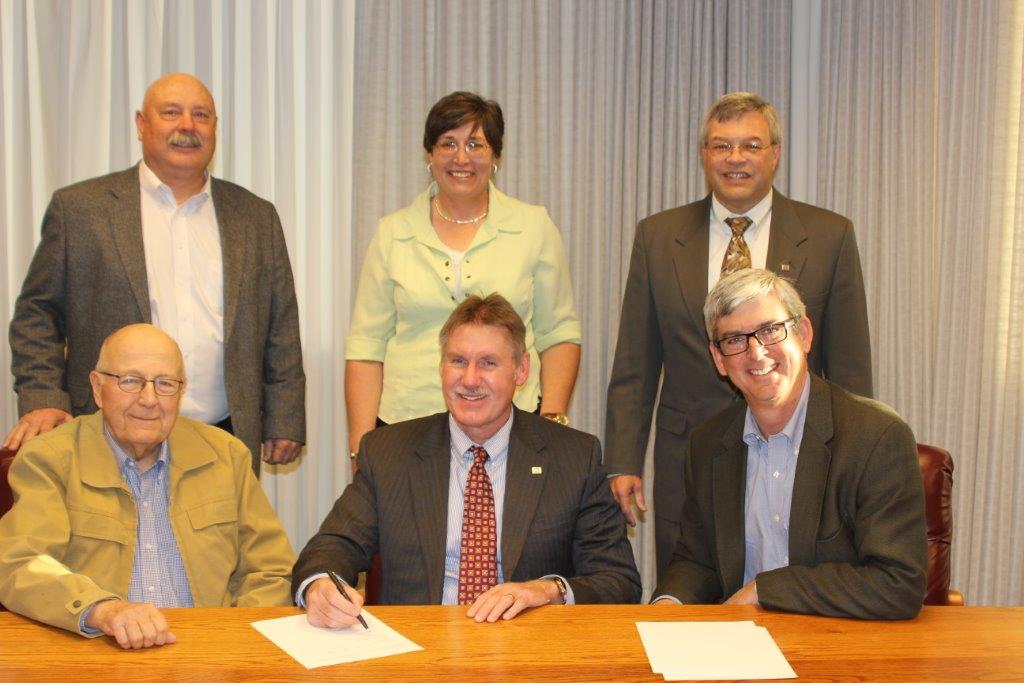
Pictured (seated, from left) are: Josey, Vice President and Chairman of the Board; Dr. Quint Thurman, Sul Ross interim President; Robert J. Potts, President and CEO, Dixon Water Foundation. (Standing), David Rogers, president of the Sul Ross Foundation; Dr. Bonnie Warnock, professor of Natural Resource Management; Dr. Rob Kinucan, Dean, College of Agricultural and Natural Resource Sciences. (Photo by Steve Lang)
